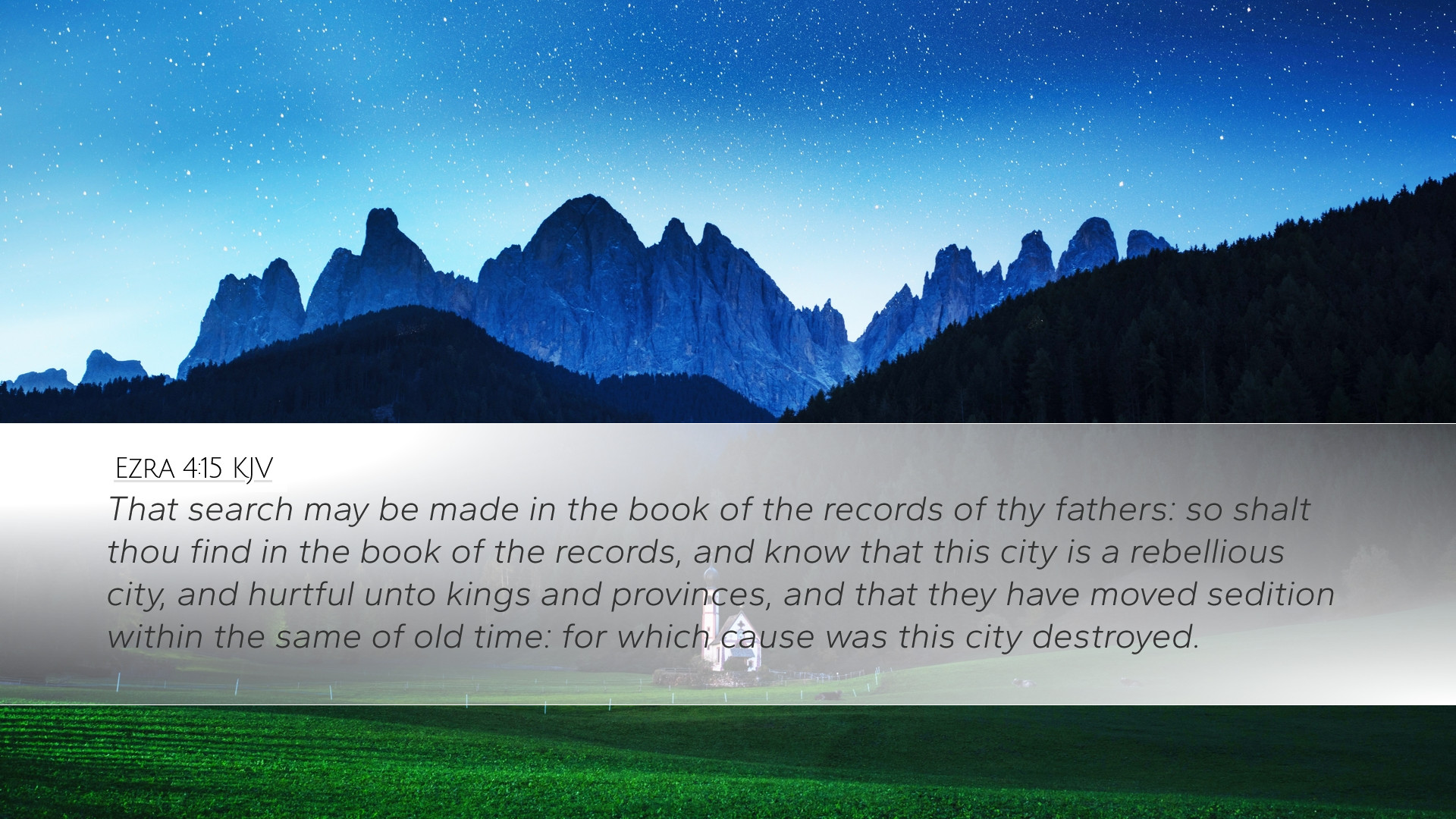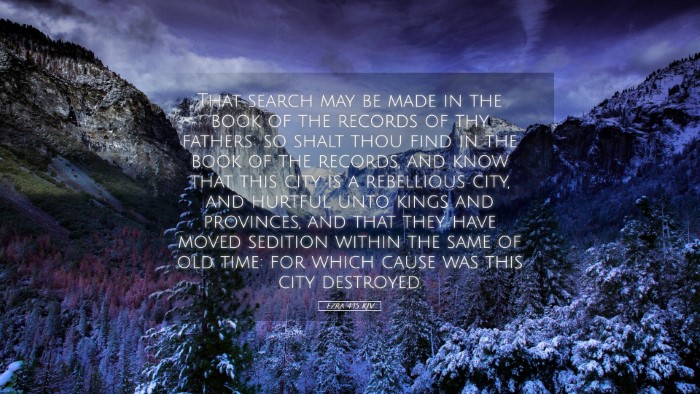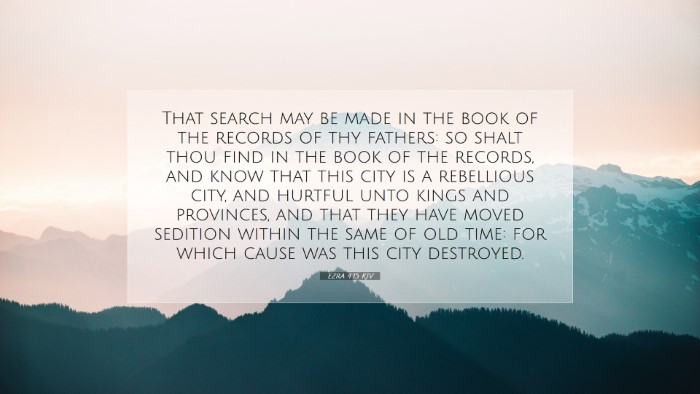Old Testament
Genesis Exodus Leviticus Numbers Deuteronomy Joshua Judges Ruth 1 Samuel 2 Samuel 1 Kings 2 Kings 1 Chronicles 2 Chronicles Ezra Nehemiah Esther Job Psalms Proverbs Ecclesiastes Song of Solomon Isaiah Jeremiah Lamentations Ezekiel Daniel Hosea Joel Amos Obadiah Jonah Micah Nahum Habakkuk Zephaniah Haggai Zechariah MalachiEzra 4:15
Ezra 4:15 KJV
That search may be made in the book of the records of thy fathers: so shalt thou find in the book of the records, and know that this city is a rebellious city, and hurtful unto kings and provinces, and that they have moved sedition within the same of old time: for which cause was this city destroyed.
Ezra 4:15 Bible Commentary
Commentary on Ezra 4:15
Ezra 4:15 (KJV): "That search may be made in the book of the records of your fathers: so shall ye find in the book of the records, and know that this city is a rebellious city, and hurtful unto kings and provinces, and have incited seditions of old time: for which cause was this city destroyed."
Overview of the Context
The verse occurs during a period of rebuilding and restoration during the return of the exiles to Jerusalem. The people who had returned under the leadership of Zerubbabel faced opposition from neighboring tribes. They were confronted with accusations and attempts to halt their work. This scenario is crucial for understanding the larger narrative of the restoration of Israel.
Historical Background
The context of Ezra 4:15 reflects the historical situation of the Jewish people post-exile. They were rebuilding Jerusalem and the temple, which had been significant in their identity and worship. The historical backdrop involves previous rebellions in Judea that had led to the destruction of the city and the temple, as well as the exile to Babylon. Understanding this background is essential for grasping the weight of the accusations made by their adversaries.
Commentary Insights
Matthew Henry’s Perspective
Matthew Henry remarks on the reasons necessitating a search of historical records. He indicates that the adversaries were intent on providing evidence from the past to justify their opposition to the rebuilding efforts of the Jews. The mention of "rebellious city" indicates a long-standing perception of Jerusalem as a place of insurrection and conflict. Henry emphasizes that the historical narrative is leveraged against the Jews, showcasing how past sins can haunt a nation even in its attempts at restoration.
Albert Barnes’ Insights
Albert Barnes elaborates on the significance of the phrase “search may be made in the book of the records.” He highlights that this call for examination reveals the political dimensions of the situation. The adversaries were not only seeking to question the motives of the Jews but also to invoke state authority by referencing historical records. Barnes notes that discussions of rebellion often serve as political tools, and in this instance, were aimed at undermining the authority of Zerubbabel and the returned exiles.
Adam Clarke’s Analysis
Adam Clarke provides a detailed exegesis on the societal implications of the verse. He points out that the accusations of insurrection were potent tools of manipulation, used to instill fear and doubt in the governing authorities regarding the intentions of the returning exiles. Clarke suggests that the very foundation of their freedom and restoration was being threatened by the malign interpretations of their past. He urges readers to recognize how societal perceptions can sway political decisions and impact spiritual movements.
Theological Reflections
The theological implications of Ezra 4:15 are manifold. The verse illustrates the tension between the pursuit of God’s promises and the realities of opposition faced by believers. The search for historical records becomes a metaphor for the challenges of interpretation within the community of faith. It reminds us that our past, both individually and collectively, can be weaponized against our present efforts in the kingdom of God.
Lessons for Today’s Believers
- The Importance of Historical Context: Recognizing how history informs present realities is crucial for understanding God’s work in our lives today.
- Dealing with Opposition: Just as the Jews faced external opposition, modern believers can draw parallels with the challenges they face whilst seeking to fulfill God’s calling.
- The Role of Remembrance: Remembering God’s past faithfulness is essential in facing current trials and maintaining hope for the future.
Practical Applications
Pastors and leaders can take these insights to heart when teaching about the struggles of faith communities. Recognizing the weight of historical narratives can encourage congregations to reflect on their heritage while being cautious of how the world views their actions. In teaching, leaders might emphasize resilience in faith amidst accusations and seek to guide their communities toward healing and reconciliation.
Encouragement for Scholars and Theologians
For scholars and theologians, engaging with Ezra 4:15 offers a rich opportunity to explore the dynamics between historical narrative, identity, and faith. The complexities of interpreting scripture within its historical framework can reveal deeper insights into both ancient and contemporary issues facing the Church.
Concluding Thoughts
In Ezra 4:15, the layers of meaning—from historical records to political manipulations—provide fertile ground for contemplation. The verse serves as a reminder of the trials and tribulations faced by those seeking to honor God amidst adversity. The insights drawn from the commentaries of Matthew Henry, Albert Barnes, and Adam Clarke continue to resonate, offering both challenge and encouragement to believers navigating their paths today.


